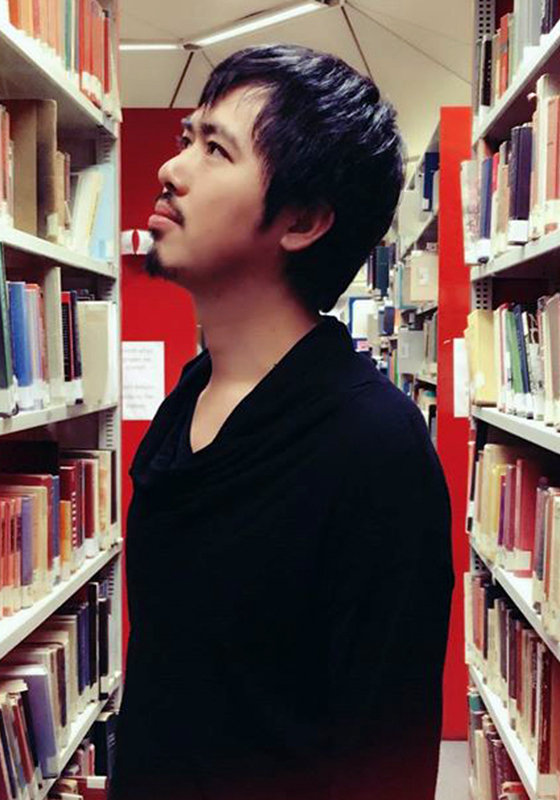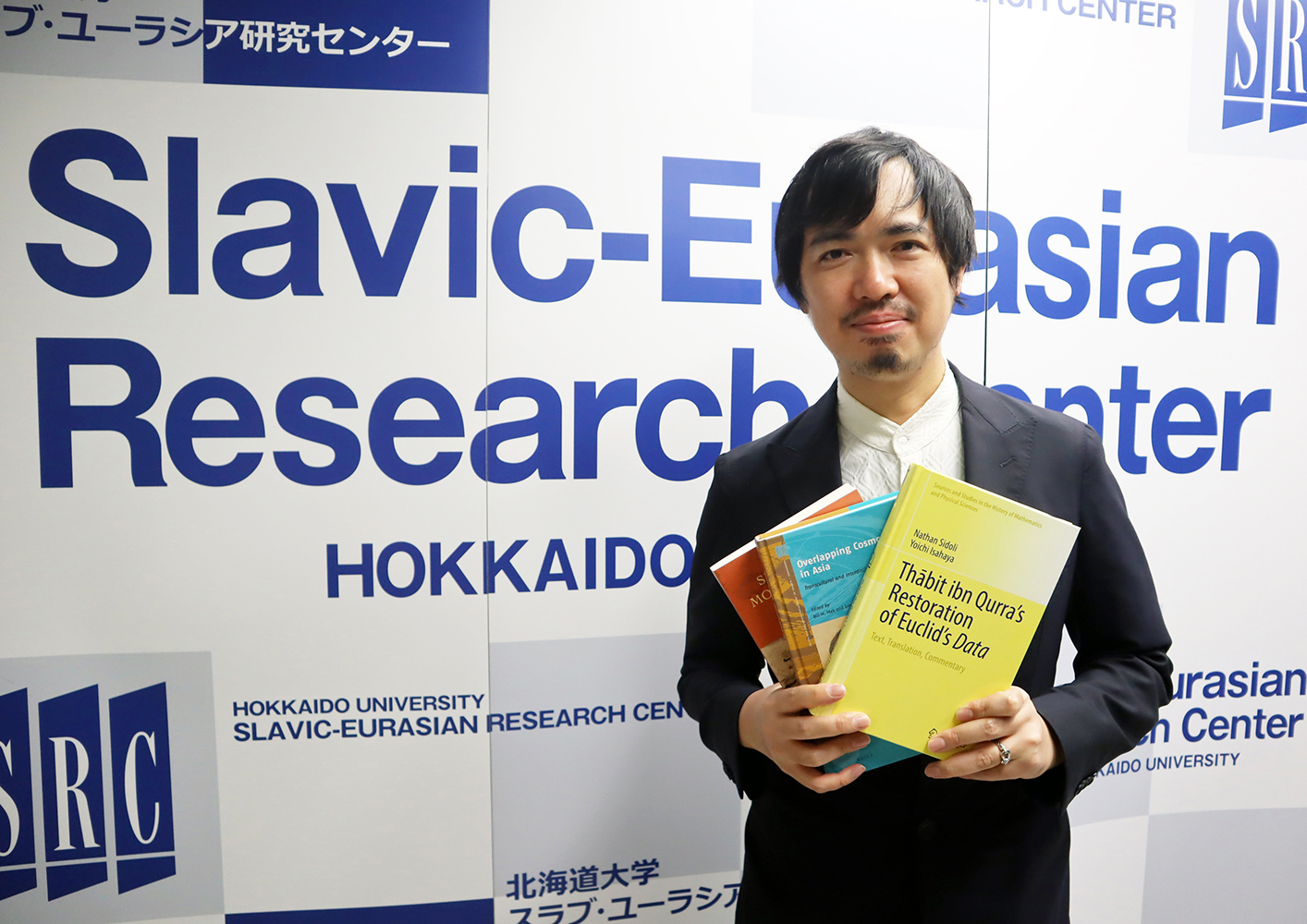
Yoichi Isahaya
Specially-Appointed Associate Professor
Histories of Premodern Central Eurasia; Mongol Empire and Sciences
Contact: yoichi.isahaya@slav.hokudai.ac.jp
Yoichi Isahaya

Education:
2015 Ph.D., Eurasian Studies, The University of Tokyo
2007 M.A., Asian History, Kobe University
2005 B.A., Asian History, Kobe University
Field of Study:
My research aims at calibrating the Mongol empire (1206–1368) on an Afro-Eurasian scale from multiple perspectives such as cross-cultural exchange and environmental history. Within this principal framework, I am engaged in the following two research projects:
1) “Astronomical Dialogue” in 13th-Century Mongol Eurasia
My PhD research project focused on a Chinese calendar composed in Persian in Iran during the 13th century, when the Mongol empire achieved political unity over Central Eurasia. This Chinese calendar in Persian was written into an Islamicate astronomical handbook (zīj) by the Muslim polymath Naṣīr al-Dīn al-Ṭūsī (1201–74), through “astronomical dialogue” with a Daoist master, Fu Mengzhi 傅孟質 (fl. ca. 1259) from China. This first delineation of the Chinese calendar in the Islamicate world symbolizes cross-cultural exchange in Mongol Eurasia. Through the lens of this cross-cultural text, we were able to trace a two-way exchange of astral sciences along the Silk Roads across centuries.
2) The “Crisis of the 14th Century” in Afro-Eurasian Context
I also manage an interdisciplinary project pertaining to the “Crisis of the 14th Century,” considered to be a poly-crisis consisting of climate change, a continental pandemic, and political disorder, which resulted in the collapse of the Mongol empire. This project is developing through interdisciplinary collaboration with scholars in various fields such as history, paleoclimatology, paleogenetics, astronomy and informatics. To understand the “Crisis of the 14th Century” as a world-historical phenomenon that transformed world history, we need to think not only in a European or even a Mediterranean context, but also on an Afro-Eurasian scale. Along these lines, the research project addresses three central points aimed to “re-orient” the Crisis of the 14th Century: 1) regional diversity, 2) uneven temporalities, and 3) the emergence of new powers.
Recent Publications (Selected):
Monographs:The Mongol Empire in the History of Eurasia. Tokyo: Misuzu Shobô (in Japanese).
(with Nathan Sidoli)Thābit ibn Qurra’s Restoration of Euclid’s Data: Text, Translation, Commentary. Cham:Springer, 2018.
Journal Articles and Book Chapters (Selected):
“Converting’ Knowledge, Culture and Themselves: Mongol Imperial Rule in Thirteenth- and Fourteenth-Century Eurasia,” Inner Asia 26/2 (2024): 279–301.
“Marāgha Ceased to Function: The Ṭūsī Family’s Intellectual Network and Īl-Khānid Political Itinerance,” Crossroads: An Interdisciplinary Journal of Asian Interactions 22/1-2 (2023): 5–25.
“Islamicate Astral Sciences in Eastern Eurasia during the Mongol-Yuan Dynasty (1271–1368),” In Routledge Handbook on Sciences in the Islamicate World: Practices from the 8th to the 19th Century, edited by S. Brentjes, 688–695. London: Routledge, 2022.
“Geometrizing Chinese Astronomy? The View from a Diagram in the Kashf al-ḥaqāʾiq by al-Nīsābūrī (d. ca. 1330),” In Overlapping Cosmologies in Asia: Transcultural and Interdisciplinary Approaches , edited by B. Mak & E. Huntington, 139–169. Leiden: Brill, 2022.
“From Alamut to Dadu: Jamāl al-Dīn’s Armillary Sphere on the Mongol Silk Roads,” Acta Orientalia Academiae Scientiarum Hungaricae 74/1 (2021): 65–78.
“Fu Mengzhi: “The Sage of Cathay” in Mongol Iran and Astral Sciences along the Silk Roads,” In Along the Silk Roads in Mongol Eurasia: Generals, Merchants, and Intellectuals, edited by M. Biran, J Brack & F. Fiaschetti, 238–254. Berkeley: University of California Press, 2020.
“Sino-Iranica in Pax Mongolica: The Elusive Participation of Syriac-Rite Christians in the Ilkhanid Translation Project,” In Marco Polo and the Silk Road (10th–14th Centuries), edited by Rong X. & Dang B., 341–362. Beijing: Peking University Press, 2019.
(with Jyuh Fuh Lin) “Entangled Representation of Heaven: A Chinese Divination Text from a Tenth-Century Dunhuang Fragment (P. 4071),” Historia Scientiarum 26/3 (2017): 153–171.
“The Tārīkh-i Qitā in the Zīj-i Īlkhānī: the Chinese Calendar in Persian,” SCIAMVS: Sources and Commentaries in Exact Sciences 14 (2013): 149–258.
“History and Provenance of the “Chinese” Calendar in the Zīj-i Īlkhānī,” Tarikh-e Elm: Iranian Journal for the History of Science 8 (2009): 19–44.
Academia:
https://hokudai.academia.edu/YoichiIsahaya
Invited Lectures (Selected):
“The “Imperial Itinerance” of the Golden Horde.” International Conference “The Golden Horde: Art, Material Culture, and Architecture,” funded by the Fritz Thyssen Foundation. Berlin (Hybrid): Max Planck Institute for the History of Science, 8th December 2023.
“Beyond Commensurability: Chinese Calendar in Islamicate Astronomical Handbook in the Period of the Mongol Empire (1206–1368).” International Conference “Transmission, Translocation, and Transcreation: A Cultural Kinematics of Astral Knowledge,” on the Gerda Henkel Stiftung funded research project “Changing Episteme in Early Modern Sanskrit Astronomy.” Copenhagen (Hybrid): University of Copenhagen, 14th November 2023.
“Along the River or between the Two Seas: The Imperial Itinerance of the Golden Horde.” International Symposium “Water Networks, Islands, and Political Powers in the Global Middle Ages.” Tokyo: Rikkyo University, 8th October 2023.
“Islamicate Reading of the Chinese Calendar: Quṭb al-Dīn al-Shīrāzī (1236–1311)’s Note on a Topkapı Fragment (Ahmet III 3455).” The 16th International Conference on the History of Science in East Asia, Panel 35 “Astral Sciences in Context of Cultural Encounters.” Frankfurt: Goethe-Universität Frankfurt am Main, 22 August 2023.
(with Takeshi Nakatsuka) “Snowfall in Baghdad: The Mongol Empire on the Threshold of the Little Ice Age.” Slavic-Eurasian Research Center 2023 Summer International Symposium “The Phase of Catastrophe: The Crisis of the 14th Century in Afro-Eurasian Context.” Sapporo: Hokkaido University, 13th July 2023.
“A Strange Parallel? Agrarian Crisis with Economic Efflorescence in 14th-Century Mongol Eurasia,” International Conference, “Great Chinggisid Crisis: History, Context, Aftermath.” Bonn: University of Bonn, 12th May 2023.
““Converting” Knowledge, Culture and Themselves: Mongols’ Imperial Rule in Thirteenth- and Fourteenth-Century Eurasia,” International Conference, “Nexus of Knowledge: Science, Medicine, and Technology on the Silk Roads,” Berkeley: Tang Center for Silk Road Studies, University of California, 28th April 2023.
“Did the Climate Change Shake the Empire? In the Case of the Mongols in 1270’s and 80’s,” 2023 Spring Conference of the Society of Ecological and Environmental History, “Environment and Diseases,” Busan (Online): Society of Ecological and Environmental History, 22nd April 2023.
“The Afro-Eurasian Crisis of the 14th Century in the Ilkhanid Context,” The Spring International Conference 2022, “Globalization and Localization of Mongolian Studies,” Seoul (Online): The Korean Association for Mongolian Studies, 25th March 2022.
“Knowledge-Integration vs. Knowledge-Conversion: Mongols’ Imperial Attitude toward Sciences,” The Mongol Empire’s Zoominar: “Knowledge and Empire,” Jerusalem (Online): Louis Frieberg Center for East Asia Studies at the Hebrew University of Jerusalem, 17th December 2021.
Courses Taught:
- Environmental History in Premodern Eurasia
- The Mongol Empire in the History of Eurasia
- Seminar in the History of West Asia 2020
- Global History
- Persianate World
Grants and Fellowships:
- Climate Changes, Plagues and Wars: The “Crisis of the Fourteenth Century” in the Afro-Eurasian Context (Scientific Research A, 2025–2029)
- Tree Rings, Epidemics and Bullion: The “Crisis of the Fourteenth Century” in West Asia (Fund for the Promotion of Joint International Research, 2026–2027)
- Interdisciplinary Approach to the “Crisis of the 14th Century” (JSPS Grants-in-Aid Scientific Research B, 2021–2025)
- Ilkhanid Translation Project: Toward a Mesoscopic History of Mongol Eurasia (JSPS: Grant-in-Aid for JSPS Fellows, 2018–2019)
- Sophistication of Timekeeping in the 13th and 14th Centuries Persianate Societies (JSPS: Grant-in-Aid for JSPS Fellows, 2011–2014)
- Chinese Calendar in the Islamicate Astronomical Handbooks (Zījes) (JSPS: The Institutional Program for Young Researcher Overseas Visits at The University of Tokyo, 2012)
- Transmission of the Chinese Calendar into the Persianate World (JSPS: Excellent Young Researcher Overseas Visit Program, 2010–2011)
- Transmission of the Chinese Calendar into the Persianate World (JSPS: Grant-in-Aid for JSPS Fellows, 2009–2011)
Professional Service:
- International Correspondent, Annales. Histoire, Sciences Sociales (2025–present)
- General Editor, Acta Slavica Iaponica (2024–present)
COPYRIGHT(C) Slavic-Eurasian Research Center ALL RIGHTS RESERVED.